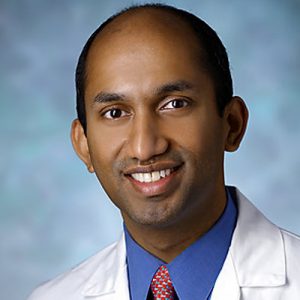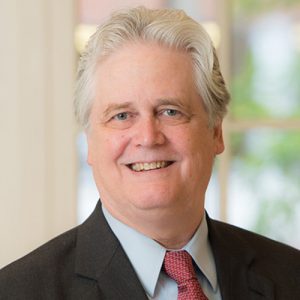School of Medicine
LISTED ALPHABETICALLY
Chetan Bettegowda, MD, PhD
Jennison and Novak Families Professor of Neurosurgery Johns Hopkins School of MedicineWe are working to develop biomarkers for cancer of the central nervous system. In particular, we are studying ways to detect tumor derived DNA in the CSF of individuals with brain cancers. We hope the levels of tumor derived DNA can be used to aid in clinical decision making.
- Neurosurgery
- Cancer
Robert Bollinger, MD, MPH
Raj & Kamla Gupta Professor of Infectious Diseases; Professor of Medicine, Public Health, and Nursing Johns Hopkins School of MedicineDr. Bollinger is the Raj and Kamla Gupta Professor of Infectious Diseases at the Johns Hopkins University (JHU) School of Medicine, and he holds joint appointments in International Health at the Johns Hopkins (JH) Bloomberg School of Public Health, and in Community Public Health at the JH School of Nursing. He is the Founding Director of the JH Center for Clinical Global Health Education (now CCGHE-ID), Associate Director for Medicine of the JH Center for Global Health, and serves on the Advisory Team for the Johns Hopkins Precision Medicine Center of Excellence for COVID-19. He is board certified by the American Board of Internal Medicine in internal medicine and infectious diseases.
- Infectious Diseases
- COVID-19
- Hepatitis
- HIV
- Pneumonia
- Tuberculosis
Steven Clipman, PhD, MSPH
Instructor of Medicine Johns Hopkins School of MedicineOur group’s work in India is focused on computational and molecular methods for improving HIV- and hepatitis C-related outcomes among key populations, such as people who inject drugs and men who have sex with men. We utilize social and spatial network analysis and phylogenetic models to understand viral transmission dynamics and are exploring machine learning methods to optimize treatment and prevention for HIV and hepatitis C.
- Data Science
- Hepatitis
- HIV
Sam Das, PhD
Assistant Professor Johns Hopkins School of MedicineI work on freely circulating or encapsulated inside exosomes RNA-based diagnostic and prognostic biomarkers.
- Genomics
- Critical Care
Ted Dawson, M.D., Ph.D.
Leonard and Madlyn Abramson Professor in Neurodegenerative Diseases Director, Institute for Cell Engineering Professor, Departments of Neurology, Neuroscience and Pharmacology & Molecular Sciences Johns Hopkins School of MedicineDr. Dawson has made important discoveries on how neurons die in genetic and sporadic models of Parkinson’s disease. Dr. Dawson's discoveries are enabling clinical strategies for disease modifying therapies and biomarkers for Parkinson’s disease and Alzheimer's disease as well as other neurodegenerative disorders.
- Neurodegenerative Diseases
Kunchok Dorjee, MBBS, PhD, MPH
Assistant Professor of Medicine Johns Hopkins School of MedicineI am broadly interested in infectious diseases. I direct a TB elimination campaign–Zero TB Kids–that seeks to eliminate TB for Tibetan refugee children using a multi-pronged approach of community mobilization, screening, treatment, and preventive therapy. Additionally, I am engaged in implementation and clinical research related to Covid-19 vaccine strategies and hepatitis B control, and etiologic research on H. pylori infection and related gastric cancer.
- COVID-19
- Hepatitis
- HIV
- Tuberculosis





